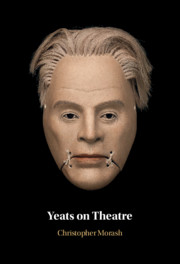Book contents
- Yeats on Theatre
- Yeats on Theatre
- Copyright page
- Contents
- Acknowledgements
- Abbreviations
- Introduction The Exact Moment
- Chapter 1 The Playwright as Thinker
- Chapter 2 The Fugitive Organum
- Chapter 3 Tragedy and Comedy
- Chapter 4 Form
- Chapter 5 Spaces and Objects
- Chapter 6 Bodies and Voices
- Chapter 7 Audiences
- Conclusion A Moment of Intense Life
- Notes
- Bibliography
- Index
Chapter 6 - Bodies and Voices
Published online by Cambridge University Press: 09 July 2021
- Yeats on Theatre
- Yeats on Theatre
- Copyright page
- Contents
- Acknowledgements
- Abbreviations
- Introduction The Exact Moment
- Chapter 1 The Playwright as Thinker
- Chapter 2 The Fugitive Organum
- Chapter 3 Tragedy and Comedy
- Chapter 4 Form
- Chapter 5 Spaces and Objects
- Chapter 6 Bodies and Voices
- Chapter 7 Audiences
- Conclusion A Moment of Intense Life
- Notes
- Bibliography
- Index
Summary
As with his theorisation of theatre space, W. B. Yeats developed a complex theorisation of bodies, masks, and voices in performance. Like other aspects of his performance theory, these grew out of his own production experience, in which he could be said to have workshopped his theories.By the middle of the second decade of the twentieth century, he was writing his Plays for Dancers, in which the moving body is put in dialogue with the spoken word in ways that challenge our view of Yeats as a poet who wrote for the theatre. Likewise, his use of voices – particularly disembodied voices – in his theatre shows a thinking through of the phenomenology of the voice.However, it is in relation to the mask, which he theorises with such complexity in works such as A Vision, that we most clearly see Yeats as someone who thinks through theatre, to borrow a concept from Alain Badiou; using the nature of performance as a means of thought.
- Type
- Chapter
- Information
- Yeats on Theatre , pp. 143 - 170Publisher: Cambridge University PressPrint publication year: 2021

